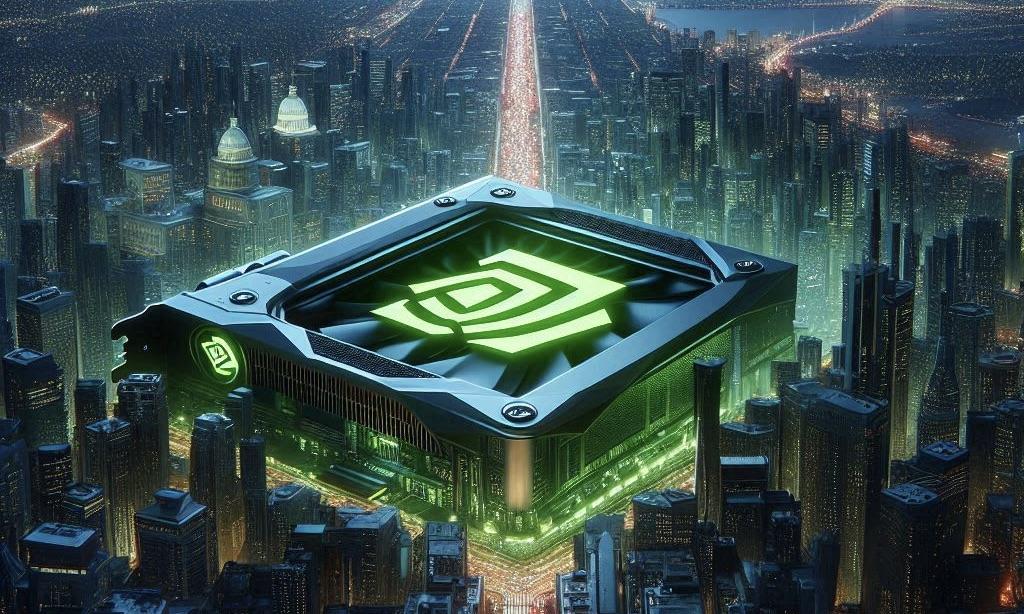Nvidia, a leading player in the semiconductor industry, could face substantial financial setbacks as the U.S. government considers imposing new trade restrictions on its China-oriented HGX-H20 AI GPU. According to a recent report by Jefferies, this move could cost Nvidia up to $12 billion in revenue, signaling a significant blow to the company’s financial health and market strategy.
The U.S. government's potential ban on the HGX-H20 is part of a broader effort to curb China’s access to advanced artificial intelligence technology. This strategic decision aligns with ongoing geopolitical tensions and aims to limit China’s technological advancements in AI, as per Tom's Hardware.
The HGX-H20, designed to meet U.S. export regulations while delivering robust AI performance, includes up to 296 INT8 TOPS/FP8 TFLOPS, 96 GB of HBM3 memory, and 4.0 TB/s memory bandwidth. Despite being less powerful on paper than other high-end processors, the HGX-H20 outperforms its competitors, including Huawei’s Ascend 920-series AI processors, in practical applications, largely due to superior memory performance.
Analysts from Jefferies highlight the potential for the U.S. to implement various forms of bans on the HGX-H20. These could range from a product-specific prohibition to the chip’s computing power or memory capacity restrictions. Such measures are expected to significantly disrupt Nvidia’s sales in China, a critical market for its advanced GPUs.
Chinese AI companies, heavily reliant on Nvidia’s CUDA platform, would face substantial challenges transitioning to alternative systems like Huawei’s Ascend processors. The compatibility of the HGX-H20 with Nvidia’s existing CUDA ecosystem makes it a preferred choice despite being slower than the top-tier H100 GPU. This reliance underscores the potential upheaval a U.S. ban could cause within the Chinese tech sector.
Current U.S. export controls have not entirely prevented Chinese companies from acquiring advanced Nvidia GPUs for AI and high-performance computing (HPC) through intermediaries or by renting cloud services from firms like Google and Microsoft. This workaround indicates the difficulty in fully enforcing such bans and suggests that Chinese entities may continue to access necessary GPU performance through alternative means.
Extending export restrictions to other Asian countries, such as Malaysia, Indonesia, and Thailand, as well as potentially overseas Chinese companies, is also under consideration. However, implementing these controls effectively presents significant challenges. Enforcing bans on access to cloud services by Chinese entities would be particularly problematic due to the vast processing power required for AI training.
As the U.S. reviews its semiconductor export policies in October, Nvidia braces for potential ramifications that could reshape its market dynamics and financial outlook. The outcome of these deliberations will affect Nvidia and have broader implications for the global semiconductor and AI industries. The tech world watches closely as this high-stakes geopolitical and economic situation unfolds, with significant impacts anticipated for all stakeholders involved.



 Nvidia Earnings Preview: AI Growth Outlook Remains Strong Beyond 2026
Nvidia Earnings Preview: AI Growth Outlook Remains Strong Beyond 2026  Coupang Reports Q4 Loss After Data Breach, Revenue Misses Estimates
Coupang Reports Q4 Loss After Data Breach, Revenue Misses Estimates  xAI’s Grok Secures Pentagon Deal for Classified Military AI Systems Amid Anthropic Dispute
xAI’s Grok Secures Pentagon Deal for Classified Military AI Systems Amid Anthropic Dispute  DeepSeek AI Model Trained on Nvidia Blackwell Chip Sparks U.S. Export Control Concerns
DeepSeek AI Model Trained on Nvidia Blackwell Chip Sparks U.S. Export Control Concerns  Hyundai Motor Plans Multibillion-Dollar Investment in Robotics, AI and Hydrogen in South Korea
Hyundai Motor Plans Multibillion-Dollar Investment in Robotics, AI and Hydrogen in South Korea  OpenAI Faces Scrutiny After Banning ChatGPT Account of Tumbler Ridge Shooting Suspect
OpenAI Faces Scrutiny After Banning ChatGPT Account of Tumbler Ridge Shooting Suspect  Trump Pushes Tech Giants to Build Power Plants to Offset AI Data Center Energy Costs
Trump Pushes Tech Giants to Build Power Plants to Offset AI Data Center Energy Costs  Meta Signs Multi-Billion Dollar AI Chip Deal With Google to Power Next-Gen AI Models
Meta Signs Multi-Billion Dollar AI Chip Deal With Google to Power Next-Gen AI Models  Nvidia Earnings Beat Expectations as AI Demand Surges, Stock Rises on Strong Revenue Outlook
Nvidia Earnings Beat Expectations as AI Demand Surges, Stock Rises on Strong Revenue Outlook  OpenAI Targets $600B Compute Spend as IPO Valuation Could Reach $1 Trillion
OpenAI Targets $600B Compute Spend as IPO Valuation Could Reach $1 Trillion  Nvidia Earnings Preview: AI Chip Demand, Data Center Growth and Blackwell Shipments in Focus
Nvidia Earnings Preview: AI Chip Demand, Data Center Growth and Blackwell Shipments in Focus  Samsung Electronics Stock Poised for $1 Trillion Valuation Amid AI and Memory Boom
Samsung Electronics Stock Poised for $1 Trillion Valuation Amid AI and Memory Boom  Hyundai Motor Group to Invest $6.26 Billion in AI Data Center, Robotics and Renewable Energy Projects in South Korea
Hyundai Motor Group to Invest $6.26 Billion in AI Data Center, Robotics and Renewable Energy Projects in South Korea  Snowflake Forecasts Strong Fiscal 2027 Revenue Growth as Enterprise AI Demand Surges
Snowflake Forecasts Strong Fiscal 2027 Revenue Growth as Enterprise AI Demand Surges  Federal Judge Blocks Virginia Social Media Age Verification Law Over First Amendment Concerns
Federal Judge Blocks Virginia Social Media Age Verification Law Over First Amendment Concerns 































